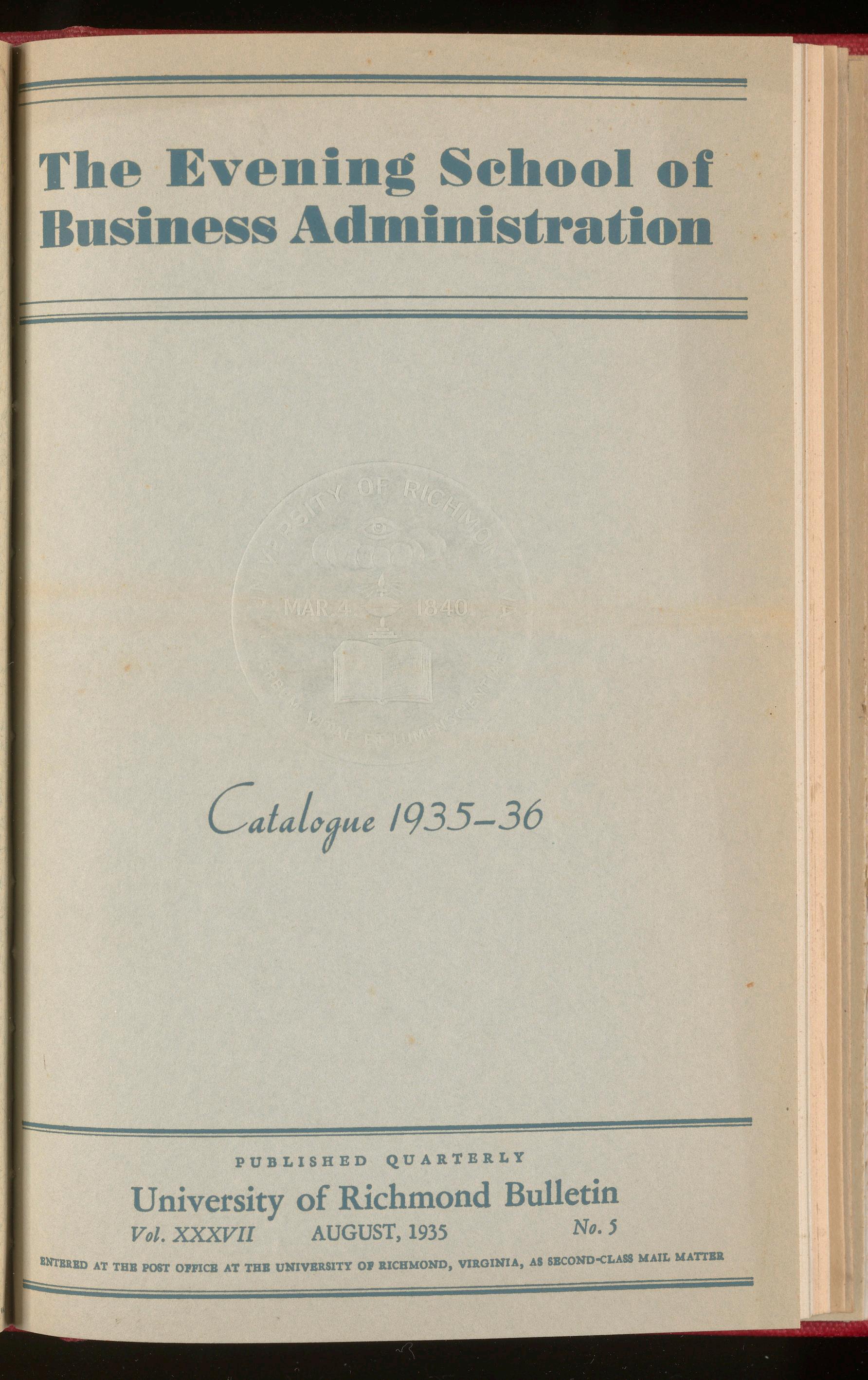

The Evening School of Business AdDtinistration


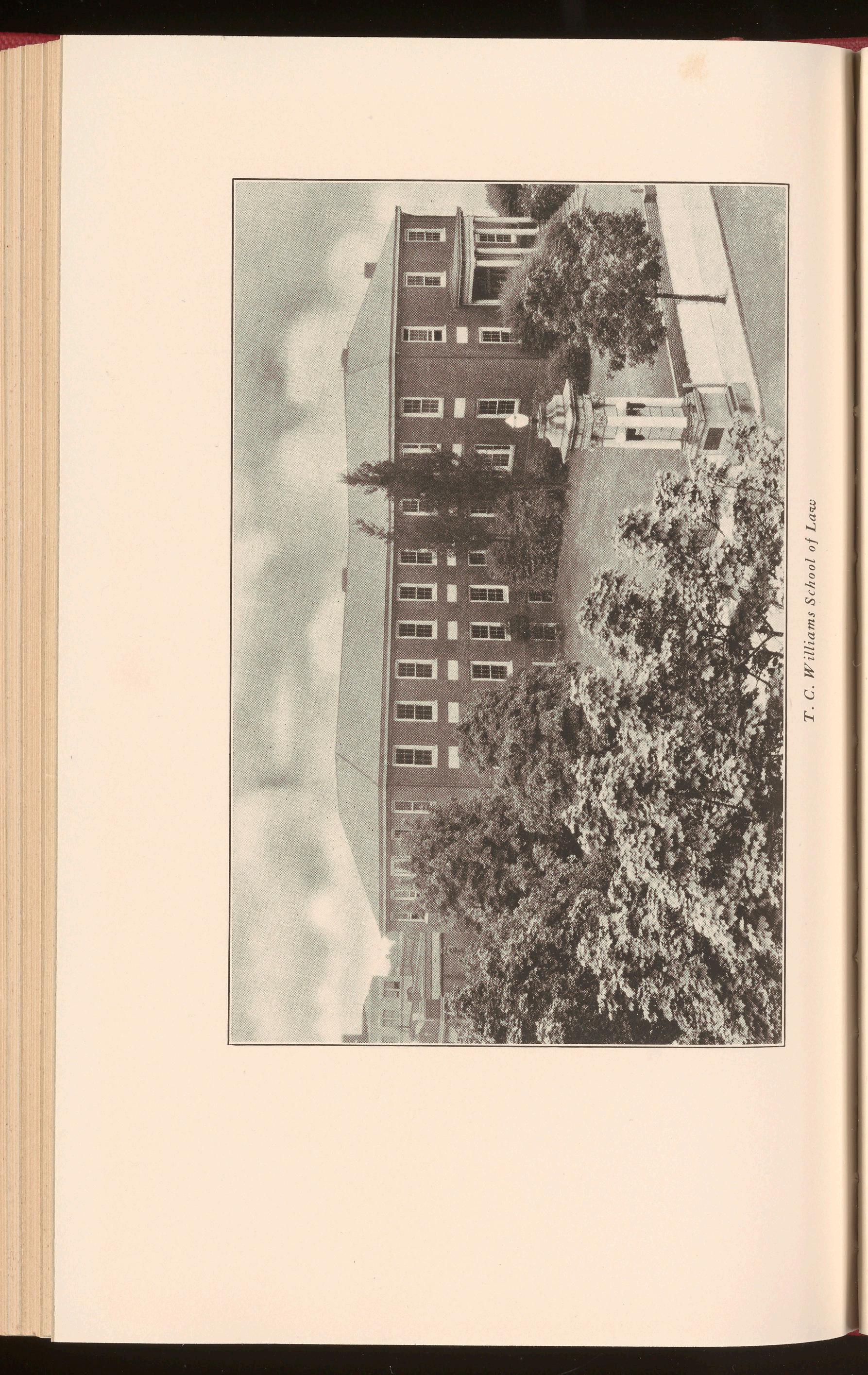
Anrwuncement of the Evening School of Busine ss Administration

Registration begins Thursday, September 19, 1935
Classes begin Monday, September 23, at 7:30 P. M.
All classes meet in biiilding of T. C. Williams Law School-Lombardy and Grace Streets FOR INFORMATION ADDRESS
J OHN J. CORSON, III., Director 601 North Lombardy Street Richmond, Va.
BOARD of COUNSELORS
T. COLEMAN ANDREWS
JOHN STEWART BRYAN
NORMAN CALL
JOiiN B. CARY
DOUGLAS s. FREEMAN
CHESLEY S. GOLDSTON
JACK G. HOLTZCLAW
J. AMBLER JOHNSTON
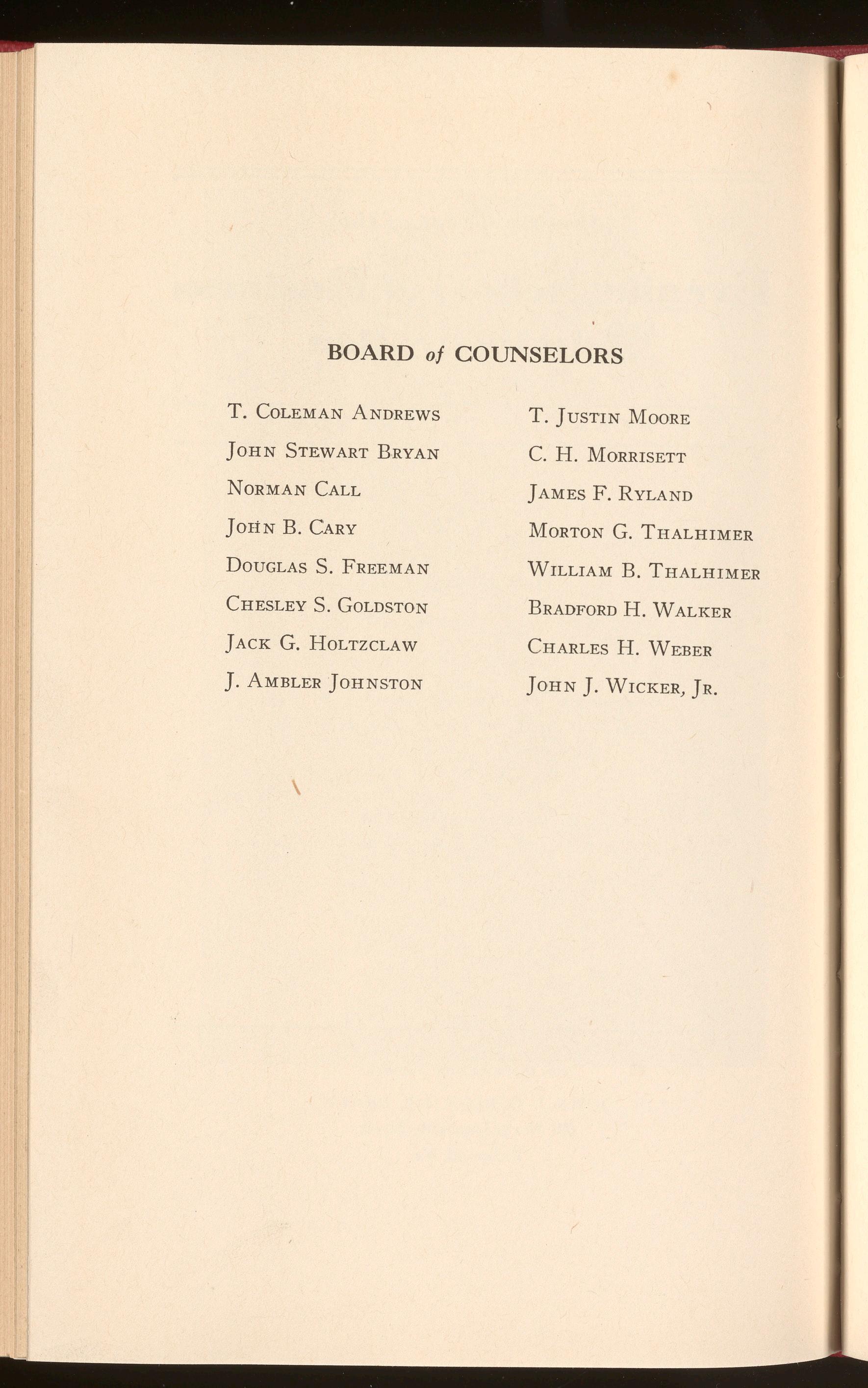
T. JUSTIN MOORE
C. H. MORRISETT
JAMES F. RYLAND
MORTON G. THALHIMER
WILLIAM B. THALHIMER
BRADFORD H. WALKER
CHARLES H. WEBER
JOHN J. WICKER, JR.

CALENDAR +
FIRST SEMESTER
SEPTEMBER19TH, THURSDAY-Registration of Students.
SEPTEMBER23RD, MONDAY-Classes begin.
DECEMBER21ST, SATURDAY-Christmas Holidays begin.
JANUARY2ND, THURSDAY-Class work resumed.
JANUARY7TH, MONDAY-Examinations begin.
FEBRUARYlsT, SATURDAY-Close of First Semester.
SECOND SEMESTER
FEBRUARY3RD, MONDAY-Second Semester begins.
APRIL 11TH, FRIDAY-Spring Vacation begins.
APRIL 14TH, TuESDAY-Oass work resumed.
JUNE ls ,T, MONDAY-Examinations begin.
JuNE 6TH, SATURDAY-Close of Second Semester.
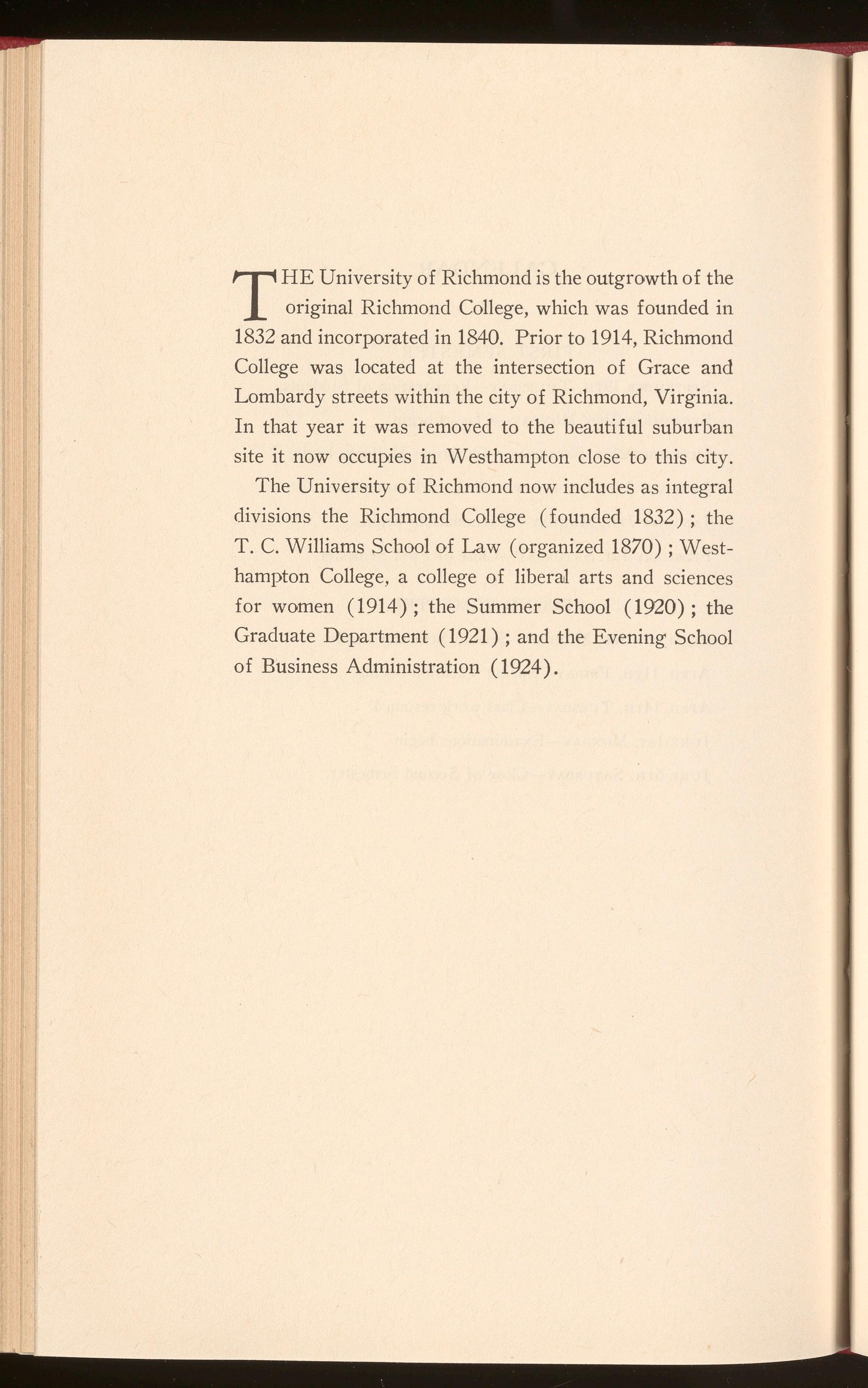
THE University of Richmond is the outgrowth of the original Richmond College, which was founded in 1832 and incorporated in 1840. Prior to 1914, Richmond College was located at the intersection of Grace and Lombardy streets within the city of Richmond, Virginia. In that year it was removed to the beautiful suburban site it now occupies in Westhampton close to this city. The University of Richmond now includes as integral divisions the Richmond College ( founded 1832) ; the T. C. Williams School of Law (organized 1870); Westhampton College, a college of libera,l arts and sciences for women (1914); the Summer School (1920); the Graduate Department (1921); and the Evening School of Business Administration ( 1924).
ADMINISTRATIVE OFFICERS
FREDERICK WILLIAM BOATWRIGHT, M.A., LLD. PRESIDENT
BENJAMIN WEST TABB, B.A. VICE-PRESIDENT AND TREASURER
JOHN J. CORSON, III., PH.I:. DIRECTOR
FRANCES FARMER, B.A., LLB. SECRETARY
FACULTY of INSTRUCTION
SAMUEL M. FOSTER, M.A., C.P.A.
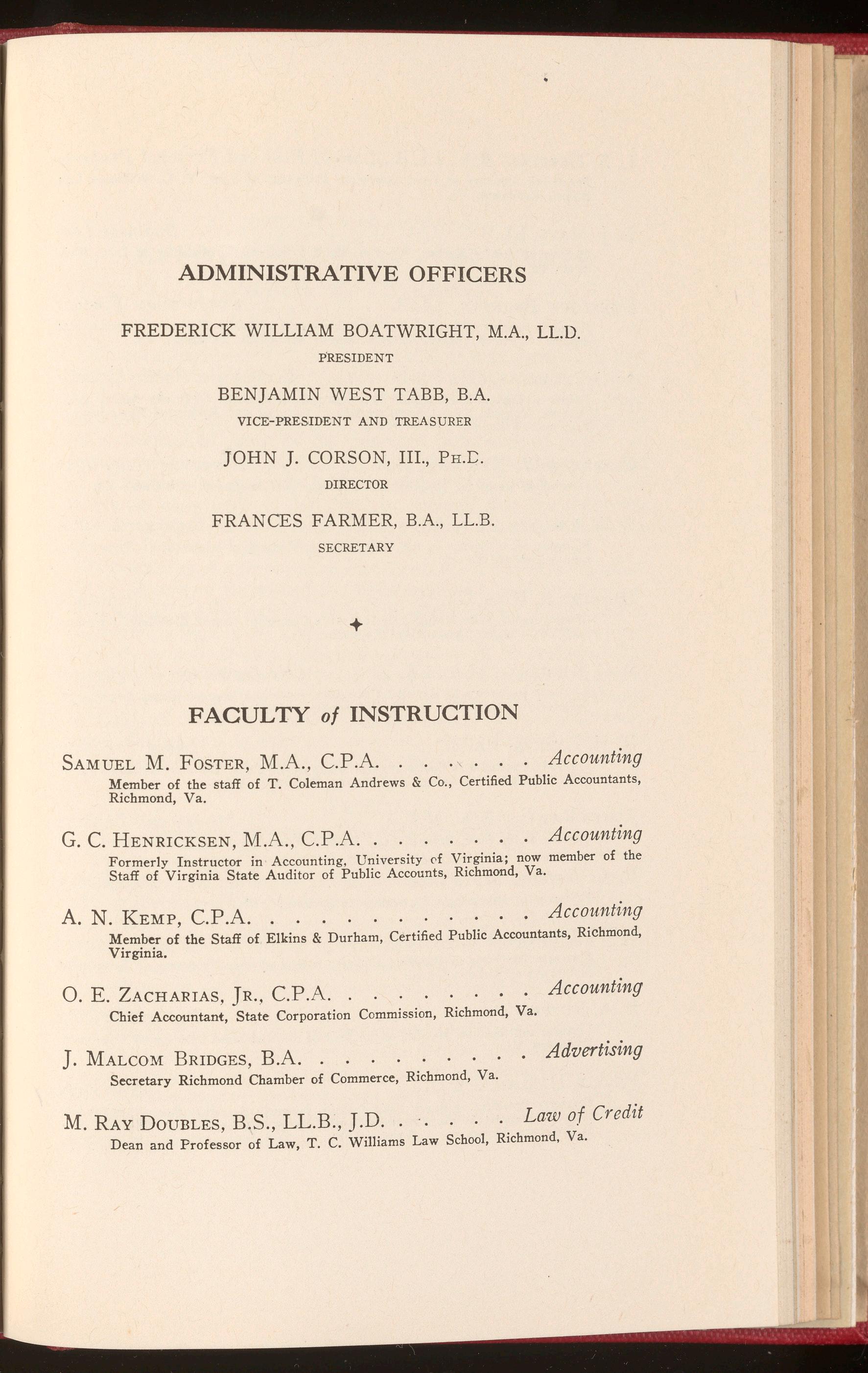
Accounting
Member of the staff of T. Coleman Andrews & Co., Certified Public Accountants, Richmond, Va.
G. C. HENRICKSEN, M.A., C.P.A ..
Accounting
Formerly Instructor in Accounting, University <'f Virginia; now member of the Staff of Virginia State Auditor of Public Accounts, Richmond, Va.
A. N. KEMP, C.P.A.
Accounting
Member of the Staff of Elkins & Durham, Certified Public Accountants, Richmond, Virginia.
0. E. ZACHARIAS, JR., C.P.A. .
Accounting Chief Accountant, State Corporation Commission, Richmond, Va.
J. MALCOM BRIDGES, B.A.
Secretary Richmond Chamber of Commerce, Richmond, Va.
M. RAY DOUBLES, B.S., LL.B., J.D ..
Advertising
Law of Credit Dean and Professor of Law, T. C. Williams Law School, Richmond. Va.
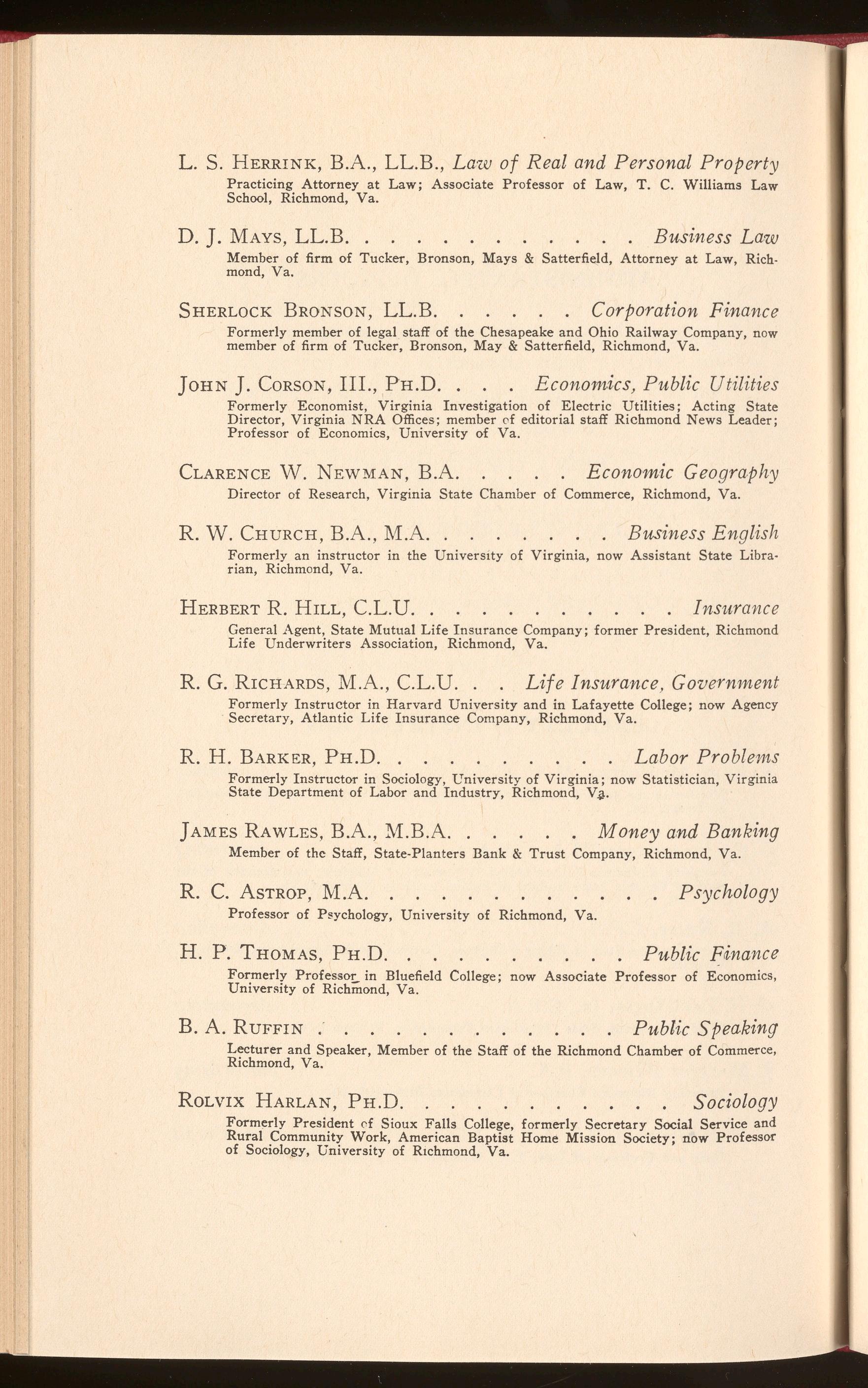
L. S. HERRINK, B.A., LL.B., Law of Real and Personal Property
Practicing Attorney at Law; Associate Professor of Law, T. C. Williams Law School, Richmond, Va.
D. J. MAYS, LLB. Business Law
Member of firm of Tucker, Bronson, Mays & Satterfield, Attorney at Law, Richmond, Va.
SHERLOCK BRONSON, LL.B. Corporation Finance
Formerly member of legal staff of the Chesapeake and Ohio Railway Company, now member of firm of Tucker, Bronson, May & Satterfield, Richmond, Va.
JOHN J. CORSON, III., PH.D .• Economics, Public Utilities
Formerly Economist, Virginia Investigation of Electric Utilities; Acting State Director, Virginia NRA Offices; member of editorial staff Richmond News Leader; Professor of Economics, University of Va.
CLARENCE VI/. NEWMAN, B.A. Economic Geography
Director of Research, Virginia State Chamber of Commerce, Richmond, Va.
R. w. CHURCH, B.A., M.A. Business English
Formerly an instructor in the University of Virginia, now Assistant State Librarian, Richmond, Va.
HERBERT R. HILL, C.L.U. Insurance
General Agent, State Mutual Life Insurance Company; former President, Richmond Life Underwriters Association, Richmond, Va.
R. G. RICHARDS, M.A., C.L.U. Life Insurance, Government
Formerly Instructor in Harvard University and in Lafayette College; now Agency Secretary, Atlantic Life Insurance Company, Richmond, Va.
R. H. BARKER, PH.D. Labor Problems
Formerly Instructor in Sociology, University of Virginia; now Statistician, Virginia State Department of Labor and Industry, Richmond, V..i.
JAMES RAWLES, B.A., M.B.A. Money and Banking
Member of the Staff, State-Planters Bank & Trust Company, Richmond, Va.
R. C. AsTROP, M.A. Psychology
Professor of Psychology, University of Richmond, Va.
H. P. THOMAS, PH.D. Public Finance
Formerly Professor in Bluefield College; now Associate Professor of Economics, University of Richmond, Va.
B. A. RUFFIN . Public Speaking
Lecturer and Speaker, Member of the Staff of the Richmond Chamber of Commerce, Richmond, Va.
RoLvix HARLAN, PH.D. Sociology
Formerly President cf Sioux Falls College, formerly Secretary Social Service and Rural Community Work, American Baptist Home Mission Society; now Professor of Sociology, University of Richmond, Va.

UNIVERSITY OF RICHMOND
EVENING SCHOOL of BUSINESS ADMINISTRATION
Training exclusively in the hard school of experience, it is now clear, is a wastefol process. Generally it is agreed that by bringing together in systematic form the experience of many years, many men and many businesses, a university course of instruction enables the individual to profit by the combined experience of others and thus to advance more rapidly. It is by thus shortening the period of apprenticeship, together with the giving of a broader and more thorough knowledge of the field in general, that the university schools of business have made for themselves a secure place in the scheme of modern education.
Recognizing the importance of this phase of modern education, the University of Richmond, in 1924, established the Evening School of Business Administration. Since its estabjishment in that year as the fourth college in the University, the Evening School has enjoyed a steady growth from an original enrollment of 51 students. The purpose of the Evening School is to offer broad, scientific business training to men and women of two groups: those who denied the op- portunity of a college education feel impelled to improve their train- ing without stopping their earnings, and those college students who desire additional training in particular fields.
Faculty
Instruction by Business Men and Professional Teachers
Two groups are represented in the faculty of the E".eni?g School of Business Administration : the professional university u~struct~r who is devotino his life to education· as a career, and the active business executive O who has achieved success in some field of business practice and who is willing to present a course in t~e school in the field of his major interest. A majority of the busmess m:n who are enlisted in the School's faculty have formerly had teachmg experience.
1hrough these two groups, each with its especial emphasis, the~e results a balanced education giving due weight to both th~ theoretical and the practical. This training gives to the young busm~ss man an understanding of the broad and basic principles underlyi_ngour economic system, together with a familiarity with the technique of approved business practice.
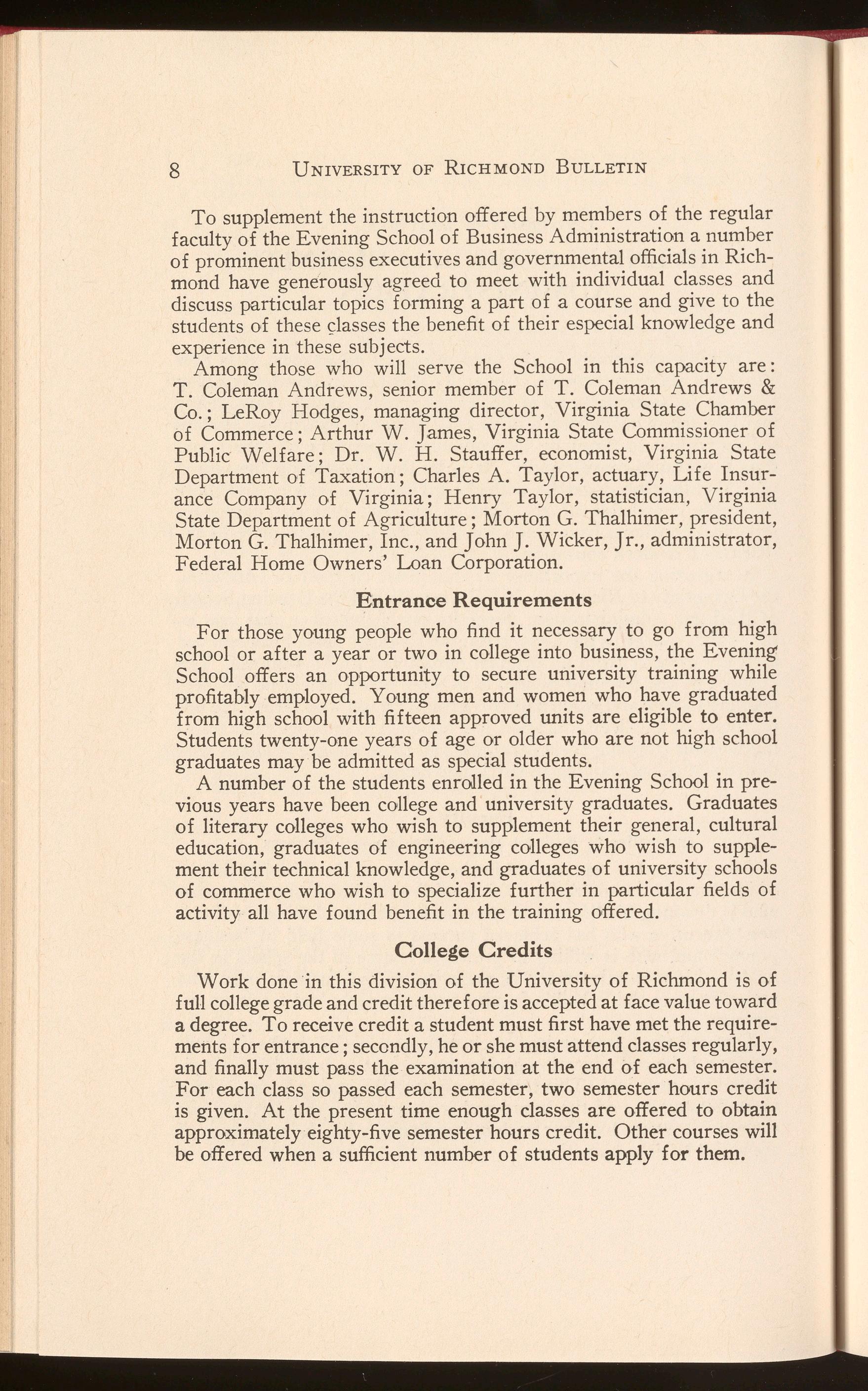
UNIVERSITY OF RICHMOND BULLETIN
To supplement the instruction offered by members of the regular faculty of the Evening School of Business Administration a number of prominent business executives and governmental officials in Richmond have generously agreed to meet with individual classes and discuss particular topics forming a part of a course and give to the students of these rlasses the benefit of their especial knowledge and experience in these subjects.
Among those who will serve the School in this capacity are: T. Coleman Andrews, senior member of T. Coleman Andrews & Co.; LeRoy Hodges, managing director, Virginia State Chamber of Commerce; Arthur W. James, Virginia State Commissioner of Public Welfare; Dr. W. H. Stauffer, economist, Virginia State Department of Taxation; Charles A. Taylor, actuary, Life Insurance Company of Virginia; Henry Taylor, statistician, Virginia State Department of Agriculture; Morton G. Thalhimer, president, Morton G. Thalhimer, Inc., and John J. Wicker, Jr., administrator, Federal Home Owners' Loan Corporation.
Entrance Requirements
For those young people who find it necessary to go from high school or after a year or two in college into business, the Evening School offers an opportunity to secure university training while profitably employed. Young men and women who have graduated from high school with fifteen approved units are eligible to enter. Students twenty-one years of age or older who are not high school graduates may be admitted as special students.
A number of the students enrolled in the Evening School in previous years have been college and university graduates. Graduates of literary colleges who wish to supplement their general, cultural education, graduates of engineering colleges who wish to supplement their technical knowledge, and graduates of university schools of commerce who wish to specialize further in particular fields of activity all have found benefit in the training offered.
College Credits
Work done in this division of the University of Richmond is of full college grade and credit therefore is accepted at face value toward a degree. To receive credit a student must first have met the requirements for entrance; secondly, he or she must attend classes regularly, and finally must pass the examination at the end of each semester. For each class so passed each semester, two semester hours credit is given. At the present time enough classes are offered to obtain approximately eighty-five semester hours credit. Other courses will be offered when a sufficient number of students apply for them.

Certificate of Proficiency
The University of Richmond will grant a Certificate of Proficiency in Business Science to any regular or special student who has success fully completed 48 semester hours credit of classroom work accor?ing to the print~d, standa~di_zed program laid out by the Evemng School of Busmess Admm1strat10n and prepared a thesis representing an independent, scholarly investigation in some particular field of business administration. The thesis must be submitted for approval to the director of the Evening School prior to February 15 of the year in which the student desires to have the certificate granted.
The program of study leading to the award of the Certificate of Proficiency in Business Science is intended for students who wish to spend at least three years in the Evening School of Business Administration and who want a condensed program of business courses that will provide them with thorough training in the general field of business.
PROGRAM OF STUDIES LEADING TO A CERTIFICATE OF PROFICIENCY IN BUSINESS SCIENCE
First Year: Business English, Accounting I, Business Law I. Principles of Economics.
Second Year: Accounting II, Money and Banking, Advertising, One Elective.
Third Year : Corporation Finance, Three Electives.
Electives may be chosen from the following listed courses: Accounting III, Accounting IV, Accounting V, Business Law, Law of Credit, Law of Real and Personal Property, Economic Geography, Retail Store Management and Merchandising, Government and Business, Insurance Principles and Practices, Current Labor Problems, Public Utility Economics, Public Finance, Public Speaking, Sociology.
Other elective subjects may be submitted for credit towards ~he certificate by special permission of the Director of the Evemng School of Business Administration.
It will be noted that while students may carry on the program of studies leading toward the granting of this certifica~e, any course offered in the Evening School may be taken for credit by a student without reference to the certificate program. It is also to be noted that students in the Evening School can and are encouraged to fulfill the requirements for the regular college d~gree_sby th~ completion of courses taken in this division of the Umvers1ty of Richmond.

UNIVERSITY OF RICHMOND BULLETIN
Specialized Training
The Evening School has been established to provide for those persons in Richmond and the vicinity unable to devote their full time to study, the types of business training of college grades these individuals need. In seeking to achieve this end the School has sought the advice of civic and business leaders of the community and has sought to co-operate with organizations of locaJ business interests in offering educational opportunities required by members of the group. The present curriculum of the School, in addition to offering courses for general business training, provides especial opportunities for prospective students of law, for students of accountancy, for insurance men, for credit men, for realtors, and others.
ENTRANCE TO THE LA w SCHOOL
All of the work done in the Evening School by a regular student is accepted in fulfillment of requirements for entrance as a regular student in the Law School. Sixty semester hours credit is required for entrance to the Law School and a student may, by carrying the maximum number of classes each year in the Evening School, prepare himself for the Law School in three years without attending any day classes whatsoever.
TRAINING FOR C. P.A. EXAMINATION
The accounting courses offered in the Evening School, if successfully passed by a regular student, are accepted as fulfillment of the educational requirement of the candidates to take the annual examinations for the certificate of Certified Public Accountant. The Business Law courses also prepare for the law division of the examination.
TRAINING FOR C. L. u. EXAMINATION
The Evening School offers all the courses required for preparation for the designation of Chartered Life Underwriters.* The Evening School co-operates directly with the American College of Life Underwriters in offering this instruction. One of the three
*1:he American College of Life Underwriters awards the degree C. L U. to properly quahfied candidates who successfully pass the series of examinations listed below:
I. Life Insurance Fundamentals, Economics of Life Insurance, Principles and Practices.
2. Life Insurance Salesmanship, Principles of Salesmanship, Psychology of Life Insur· ance Salesmanship.
3 General Education (inclnding English), Economic Problems, Sociology, Government.
4. Commercial Law, General Commercial Law, Wills, Trusts and Estates.
5. Finance, Corporation Finance , Banking and Credit, Investments . The examinations in these subjects are prepared and graded by the Examining Board of the American College of Life Underwriters, the Evening School merely supervising the ex• amination. The examination may be taken in three instailrnents , the first covering sections 1 and 2, the second covering section 3, and the third covering sections 4 and 5. The order in which installments are taken is at the option of the candidate.

C. L. U.'s in Richmond received his preparation in the Evening School. The courses in insurance are also designed to prepare students who desire to obtain the educational certificates offered by the Life Office Management Association Institute.
TRAINING FOR CREDIT WORK
In co-operation with the Richmond Association of Credit Men and the National Association of Credit Men, the Evening School off ers training for local residents working in the field of credit and collections. Courses now offered prepare students for the major part of the requirements of the National Institute of Credit for its junior and senior educational certificates. Courses in other subjects re(_!uired for these certificates will be organized if a sufficient number of students enroll for such training.
Vocational Counseling and Placement of Students
To help students find the vocation for which they are best suited, members of the staff of the Evening School of Business Administration will during the week of September 23, 1935, conduct a series o f vocational aptitude tests which may be taken by all students registering in the Evening School. The results of these scientific tests, combined with individual discussions with students, will be used as the basis for giving students who desire advice all possible assistance in determining the field of business they may wish to enter and for which they may be fitted.
Although no promise is made to secure positions for students in the Evening School of Business Administration, a systematic effort is made to find positions for students who make known to the school authorities their desire to find new positions and who have made a good record in the school. Gratifying success has attended the efforts to aid capable students in making connections with business firms.
Classes to Be Carried
Any student may carry one or more classes, according to his or her wishes or ability. It is possible for a very energetic student to carry as many as five classes each semester. This means that a student would be loaded to capacity and is recommended only to the most earnest and capabJe students. By doing so a student can obtain twenty semester hours credit each session.
Class Hours
Classes in each course will meet once each week for 100 minutes, unless stipulated otherwise in the description of particular courses, beginning at 7 :30 P. M.
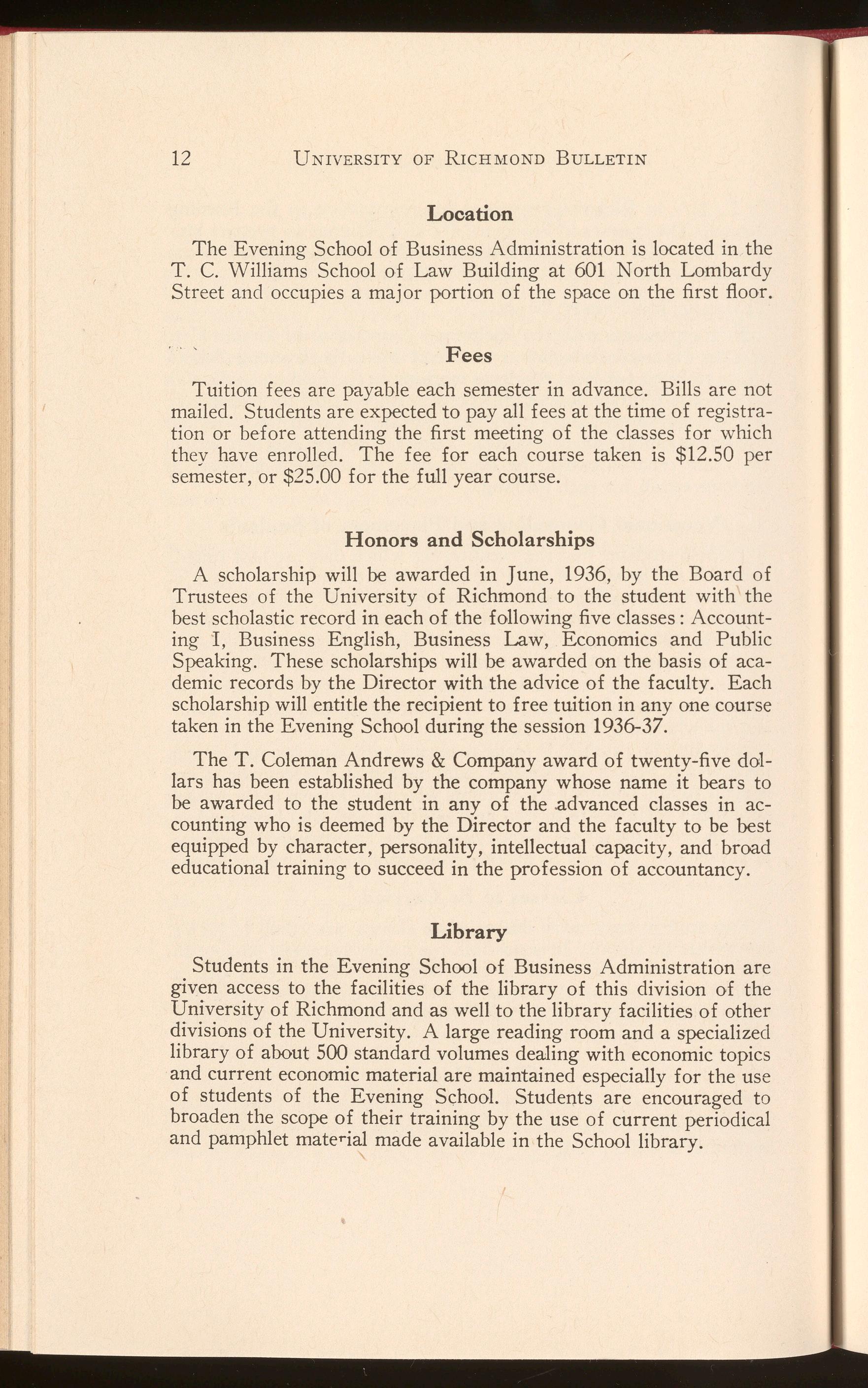
Location
The Evening School of Business Administration is located in the T. C. Williams School of Law Building at 601 North Lombardy Street and occupies a major portion of the space on the first floor.
Fees
Tuition fees are payable each semester in advance. Bills are not mailed. Students are expected to pay all fees at the time of registration or before attending the first meeting of the classes for which they have enrolled. The fee for each course taken is $12.50 per semester, or $25.00 for the full year course.
Honors and Scholarships
A scholarship will be awarded in June, 1936, by the Board of Trustees of the University of Richmond to the student with the best scholastic record in each of the following five classes : Accounting I, Business English, Business Law, Economics and Public Speaking. These scholarships will be awarded on the basis of academic records by the Director with the advice of the faculty. Each scholarship will entitle the recipient to free tuition in any one course taken in the Evening School during the session 1936-37.
The T. Coleman Andrews & Company award of twenty-five dollars has been established by the company whose name it bears to be awarded to the student in any of the .advanced classes in accounting who is deemed by the Director and the faculty to be best equipped by character, personality, intellectual capacity, and broad educational training to succeed in the profession of accountancy.
Library
Students in the Evening School of Business Administration are given access to the facilities of the library of this division of the University of Richmond and as well to the library facilities of other divisions of the University. A large reading room and a specialized library of about 500 standard volumes dealing with economic topics and current economic material are maintained especially for the use of students of the Evening School. Students are encouraged to broaden the scope of their training by the use of current periodical and pamphlet material made available in the School library.
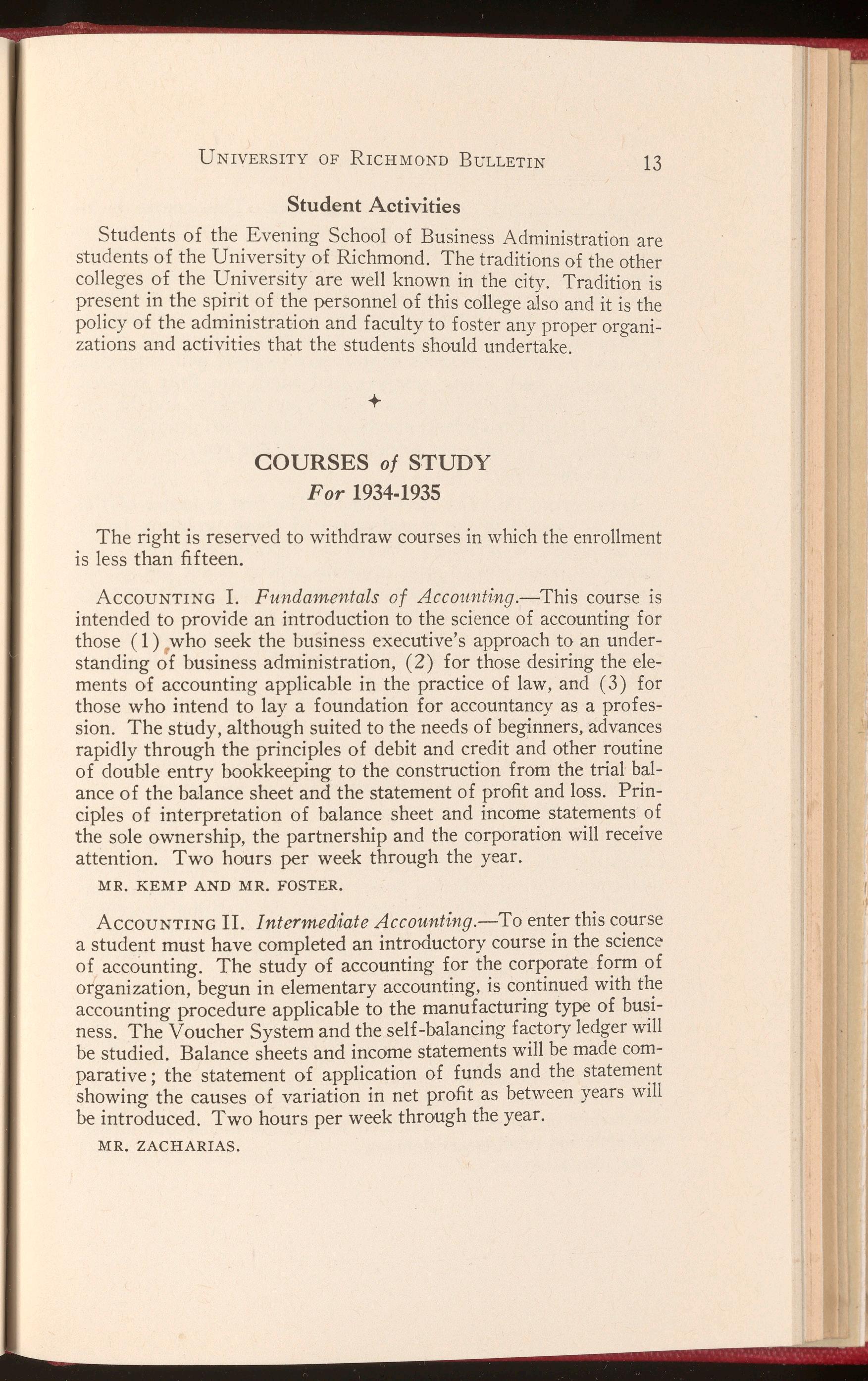
UNIVERSITYOF RICHMONDBULLETIN
Student Activities
Students of the Evening School of Business Administration are students of the University of Richmond. The traditions of the other colleges _of the 1!1:iversity are well known in the city. Tradition is present m the spmt of the personnel of this colleo-ealso and it is the policy of the administration and faculty to foster "'anyproper oro-anizations and activities that the students should undertake. 0
COURSES of STUDY
For 1934-1935
The right is reserved to withdraw courses in which the enrollment is less than fifteen.
AccoUNTING I. Fundanientals of Accounting.-This course is intended to provide an introduction to the science of accounting for those ( 1) who seek the business executive's approach to an understanding of business administration, (2) for those desiring the elements of accounting applicable in the practice of law, and (3) for those who intend to lay a foundation for accountancy as a profession. The study, although suited to the needs of beginners, advances rapidly through the principles of debit and credit and other routine of double entry bookkeeping to the construction from the trial balance of the balance sheet and the statement of profit and loss. Principles of interpretation of balance sheet and income statements of the sole ownership, the partnership and the corporation will receive attention. Two hours per week through the year.
MR. KEMP AND MR. FOSTER.
AccoUNTING II. Intermediate Accounting.-To enter this course a student must have completed an introductory course in the science of accounting. The study of accounting for the corporate form of organization, begun in elementary accounting, is co_ntinuedwith t~e accounting procedure applicable to the manufacturmg type of business. The Voucher System and the self-balancing factory ledger will be studied. Balance sheets and income statements will be made comparative; the statement of application of funds and the stateme~t showing the causes of variation in net profit as between years will be introduced. Two hours per week through the year.
MR. ZACHARIAS.
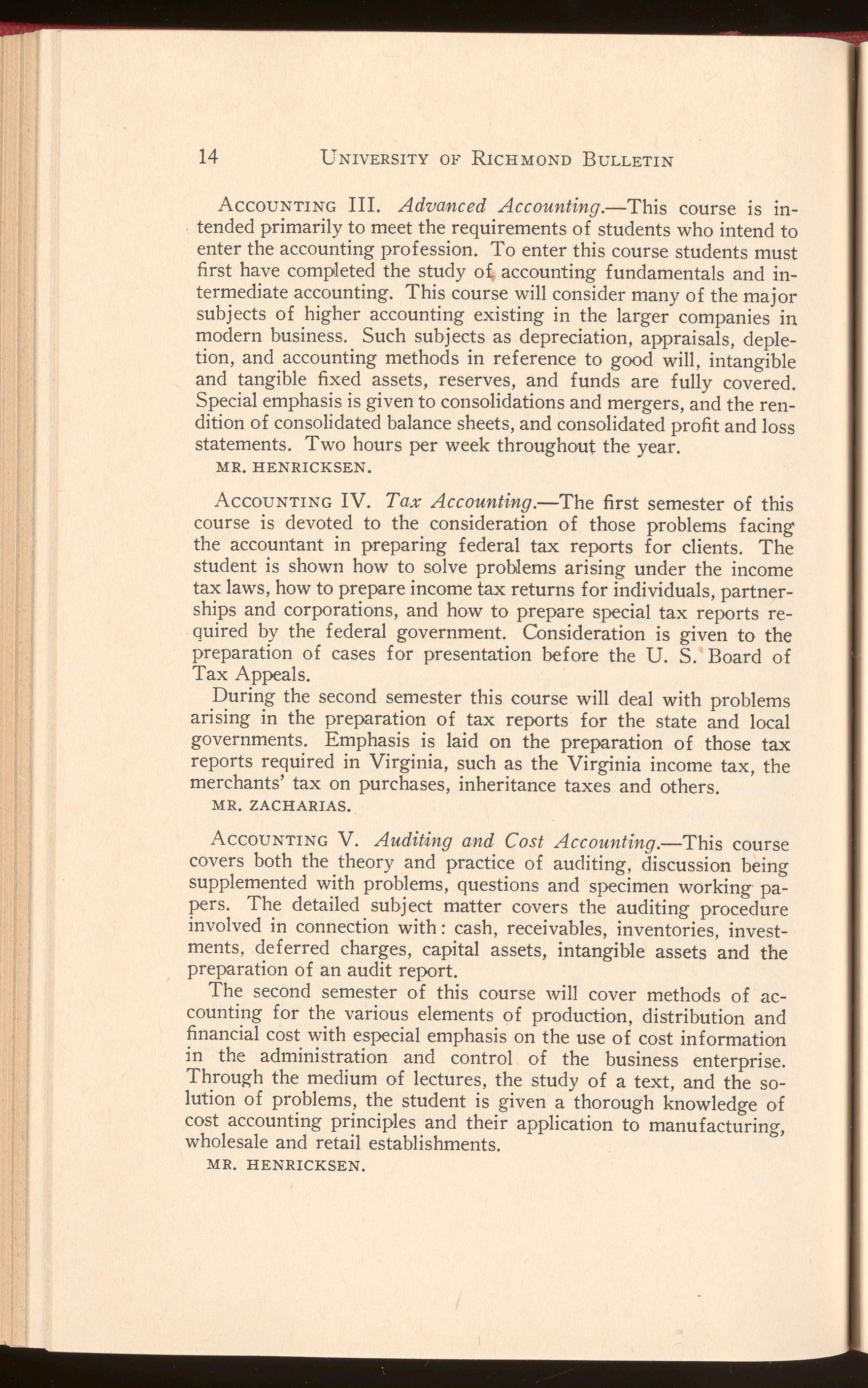
UNIVERSITY OF RICHMOND BULLETIN
AccouNTING III. Advanced Accounting.-This course is intended primarily to meet the requirements of students who intend to enter the accounting profession. To enter this course students must first have completed the study of accounting fundamentals and in- termediate accounting. This course will consider many of the major subjects of higher accounting existing in the larger companies in modern business. Such subjects as depreciation, appraisals, deple- tion, and accounting methods in reference to good will, intangible and tangible fixed assets, reserves, and funds are fully covered. Special emphasis is given to consolidations and mergers, and the ren- dition of consolidated balance sheets, and consolidated profit and loss statements. Two hours per week throughout the year.
MR. HENRICKSEN.
AccouNTING IV. Tax Accounting.-The first semester of this course is devoted to the consideration of those problems facing the accountant in preparing federal tax reports for clients. The student is shown how to solve problems arising under the income tax laws, how to prepare income tax returns for individuals, partner- ships and corporations, and how to prepare special tax reports re- quired by the federal government. Consideration is given to the preparation of cases for presentation before the U. S. Board of Tax Appeals.
During the second semester this course will deal with problems arising in the preparation of tax reports for the state and local governments. Emphasis is laid on the preparation of those tax reports required in Virginia, such as the Virginia income tax, the merchants' tax on purchases, inheritance taxes and others.
MR. ZACHARIAS.
AccouNTING V. Auditing and Cost Accounting.-This course covers both the theory and practice of auditing, discussion being supplemented with problems, questions and specimen working · pa- pers. The detailed subject matter covers the auditing procedure involved in connection with : cash, receivables, inventories, investments, deferred charges, capital assets, intangible assets and the preparation of an audit report.
The second semester of this course will cover methods of accounting for the various elements of production, distribution and financial cost with especial emphasis on the use of cost information in the administration and control of the business enterprise. Through the medium of lectures, the study of a text, and the so- lution of problems, the student is given a thorough knowledge of cost accounting principles and their application to manufacturing, wholesale and retail establishments.
MR. HENRICKSEN.
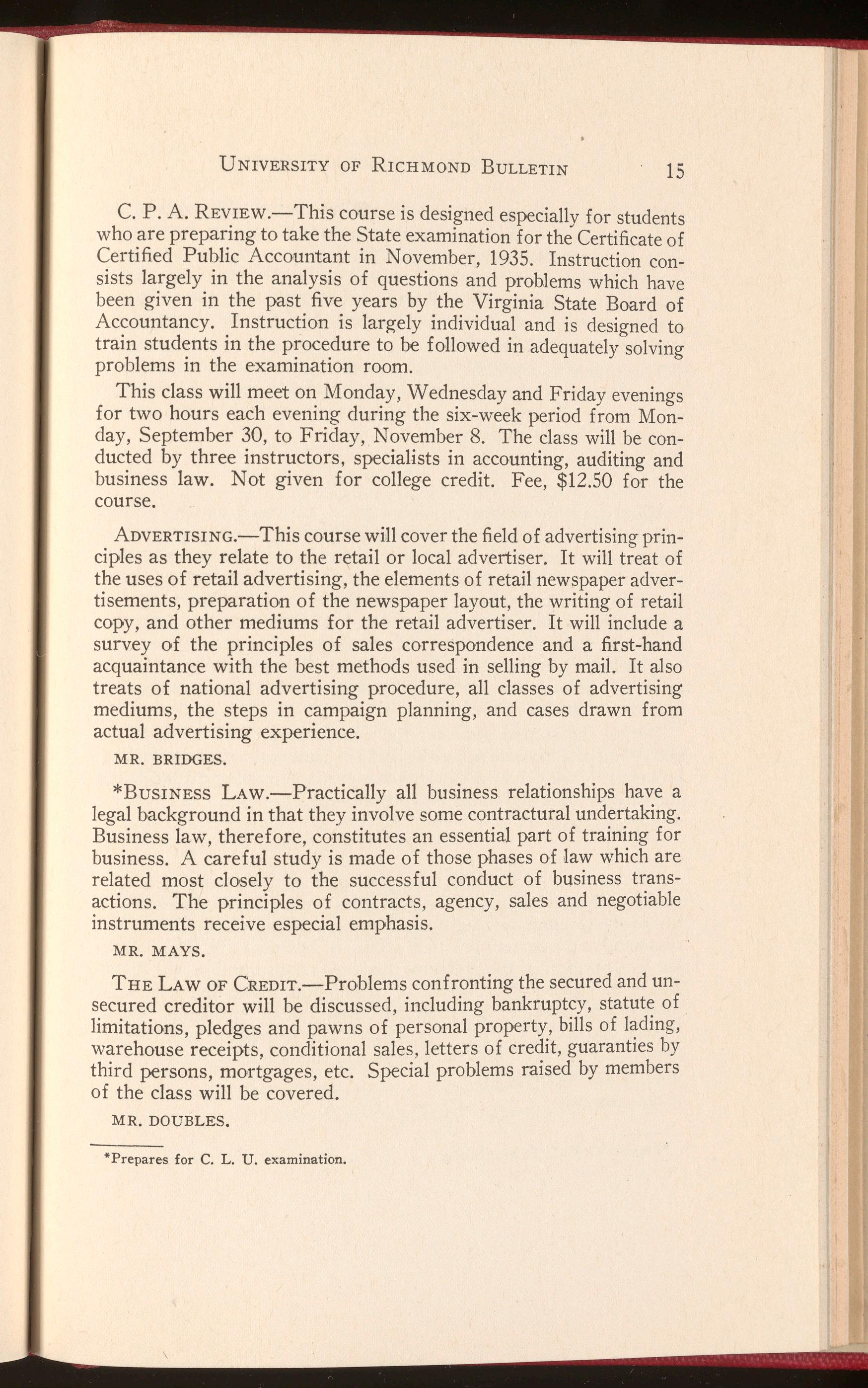
C. P.A. REvIEw.-This course is designed especially for students who are preparing to take the State examination for the Certificate of Certified Public Accountant in November, 1935. Instruction consists largely in the analysis of questions and problems which have been given in the past five years by the Virginia State Board of Accountancy. Instruction is largely individual and is designed to train students in the procedure to be followed in adequately solving problems in the examination room.
This class will meet on Monday, Wednesday and Friday evenings for two hours each evening during the six-week period from Monday, September 30, to Friday, November 8. The class will be conducted by three instructors, specialists in accounting, auditing and business law. Not given for college credit. Fee, $12.50 for the course.
ADVERTISING.-This course wiU cover the field of advertising principles as they relate to the retail or local advertiser. It will treat of the uses of retail advertising, the elements of retail newspaper advertisements, preparation of the newspaper layout, the writing of retail copy, and other mediums for the retail advertiser. It will include a survey of the principles of sales correspondence and a first-hand acquaintance with the best methods used in selling by mail. It also treats of national advertising procedure, all classes of advertising mediums, the steps in campaign planning, and cases drawn from actual advertising experience.
MR. BRIDGES.
*BUSINESS LAw.-Practically all business relationships have a legal background in that they involve some contractural undertaking. Business law, therefore, constitutes an essential part of training for business. A careful study is made of those phases of , law which are related most closely to the successful conduct of business transactions. The principles of contracts, agency, sales and negotiable instruments receive especial emphasis.
MR. MAYS.
THE LAW OF CREDIT.-Problems confronting the secured and unsecured creditor will be discussed, including bankruptcy, statut~ of limitations, pledges and pawns of personal property_, bills of l~dmg, warehouse receipts, conditional sales, letters of cre~1t, guaranties by third persons, mortgages, etc. Special problems raised by members of the class will be covered.
MR. DOUBLES.
*Prepares for C. L. U. examination.
16

UNIVERSITYOF RICHMONDBULLETIN
THE LAw OF REAL ANDPERSONALPRoPERTY.-Methods of acquiring property-deeds, wills, inheritance, statute of limitations, gifts, etc.; estates created-fee simple, life, term of years, etc.; cotenancy-joint, in common, co-parcenary, and entirety; liens-common law, mechanics, judgment, etc.; incorporeal interests in landprofits, easements and licenses ; landlord and tenant; building restrictions; examination of title.
This course is of special importance to those whose work concerns real estate-the realtor, the broker, the insurance agent, the manager of an estate. Every business man, however, should have a knowledge of the law of property.
MR. HERRINK.
*CORPORATIONFINANCE.-This is an advanced course dealing with the financial problems confronting business men as a result of the tremendous growth in the size of modern industrial organizations. The first semester comprises a study of underlying problems : the place of the corporation in modern business, advantages and disadvantages of corporate organization, legal organization, corporat e promotion, capitalization, types of securities, earnings, expenses and surplus, and insolvency or reorganization. Special emphasis will be given to changing conditions and new problems arising under the Federal Securities Act of 1933.
During the second semester the course is devoted more to the marketing of corporate securities and the functions of underwriting, brokerage houses and the stock exchanges in providing capital funds for various sizes and kinds of corporations.
MR. BRONSON.
*PRINCIPLESOF EcoNoMrcs.-The aim of this course is to give students an appreciation of the principles underlying business activities of the communities and to enable them to apply sound economic reasoning to the current practical affairs of business life. The following list is typical of the problems analyzed : consumption, the distribution of wealth, organization of production, value and exchange, money and banking, international trade, labor problems, public finance and social control of business. The discussion will be only moderately technical and the course will include analyses of immediate economic problems.
MR. CORSON.
*Prepares for C. L. U. examination.
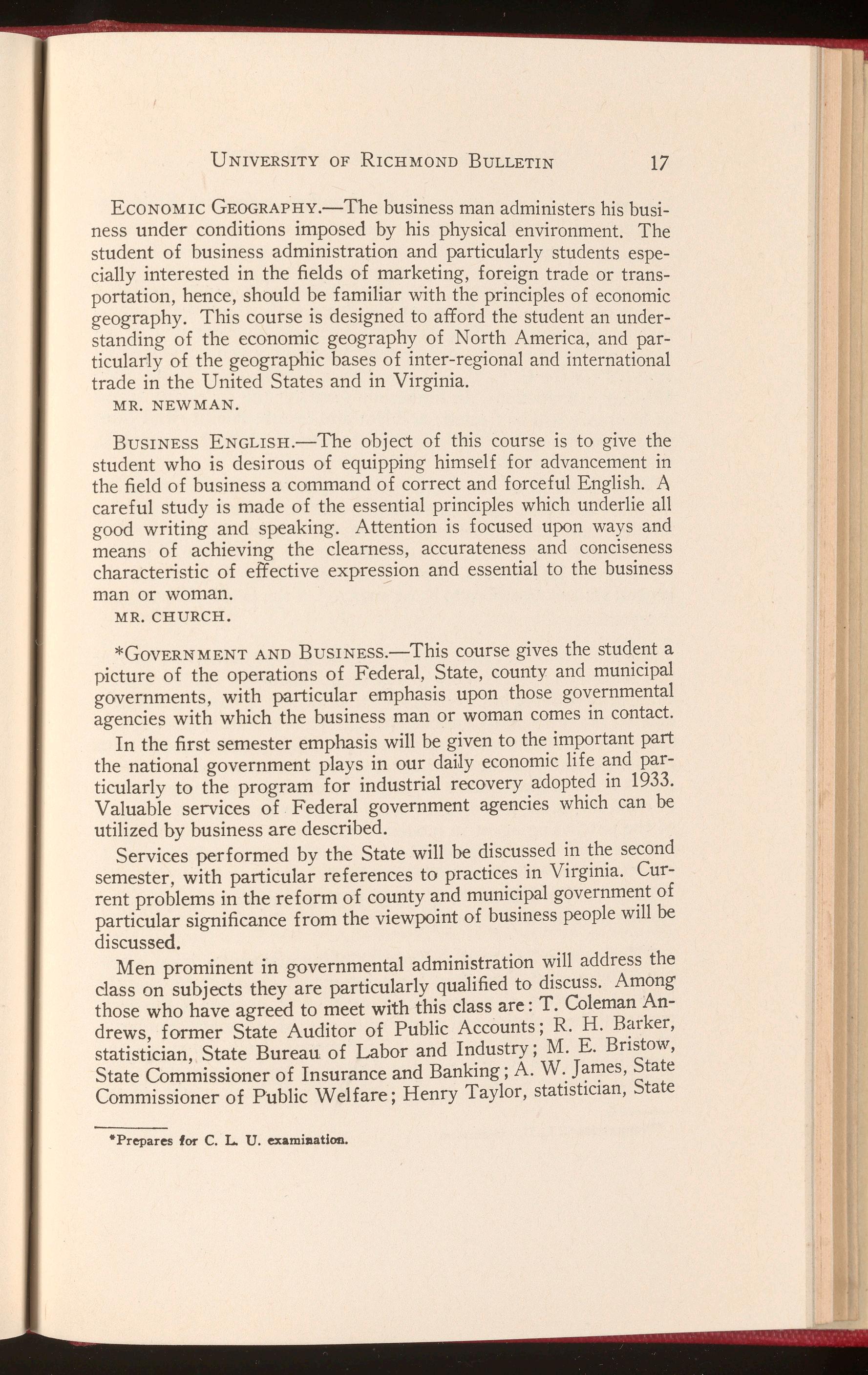
UNIVERSITYOF RICHMONDBULLETIN 17
ECONOMICGEOGRAPHY.-The business man administers his business under conditions imposed by his physical environment. The s!ude1:t of busin~ss administration and_ particularly students especially mterested m the fields of marketmg, foreign trade or transportation, hence, should be familiar with the principles of economic geography. This course is designed to afford the student an unders~anding of the economi~ geographf of No1:-thAmerica, and particularly of the geographic bases of mter-reg1onal and international trade in the United States and in Virginia.
MR. NEWMAN.
BusINESS ENGLISH.-The object of this course is to give the student who is desirous of equipping himself for advancement in the field of business a command of correct and forceful English. A careful study is made of the essential principles which underlie all good writing and speaking. Attention is focused upon ways and means of achieving the clearness, accurateness and conciseness characteristic of effective expression and essential to the business man or woman.
MR. CHURCH.
*GOVERNMENTAND BusINESS.-This course gives the student a picture of the operations of Federal, State, county and municipal governments, with particular emphasis upon those governmental agencies with which the business man or woman comes in contact.
In the first semester emphasis will be given to the important part the national government plays in our daily economic life and particularly to the program for industrial recovery adopted in 1933. Valuable services of Federal government agencies which can be utilized by business are described.
Services performed by the State will be discussed in the second semester, with particular references to practices in Virginia. Current problems in the reform of county and municipal government of particular significance from the viewpoint of business people will be discussed.
Men prominent in governmental administration will address the class on subjects they are particularly qualified to discuss. Among those who have agreed to meet with this class are: T. Coleman Andrews, former State Auditor of Public Accounts; R. H. Barker, statistician, State Bureau of Labor and Industry; M. E. Bristow, State Commissioner of Insurance and Banking; A. W. James, State Commissioner of Public Welfare; Henry Taylor, statistician, State
•Prepares f~ C. I. U. examiaatlon.
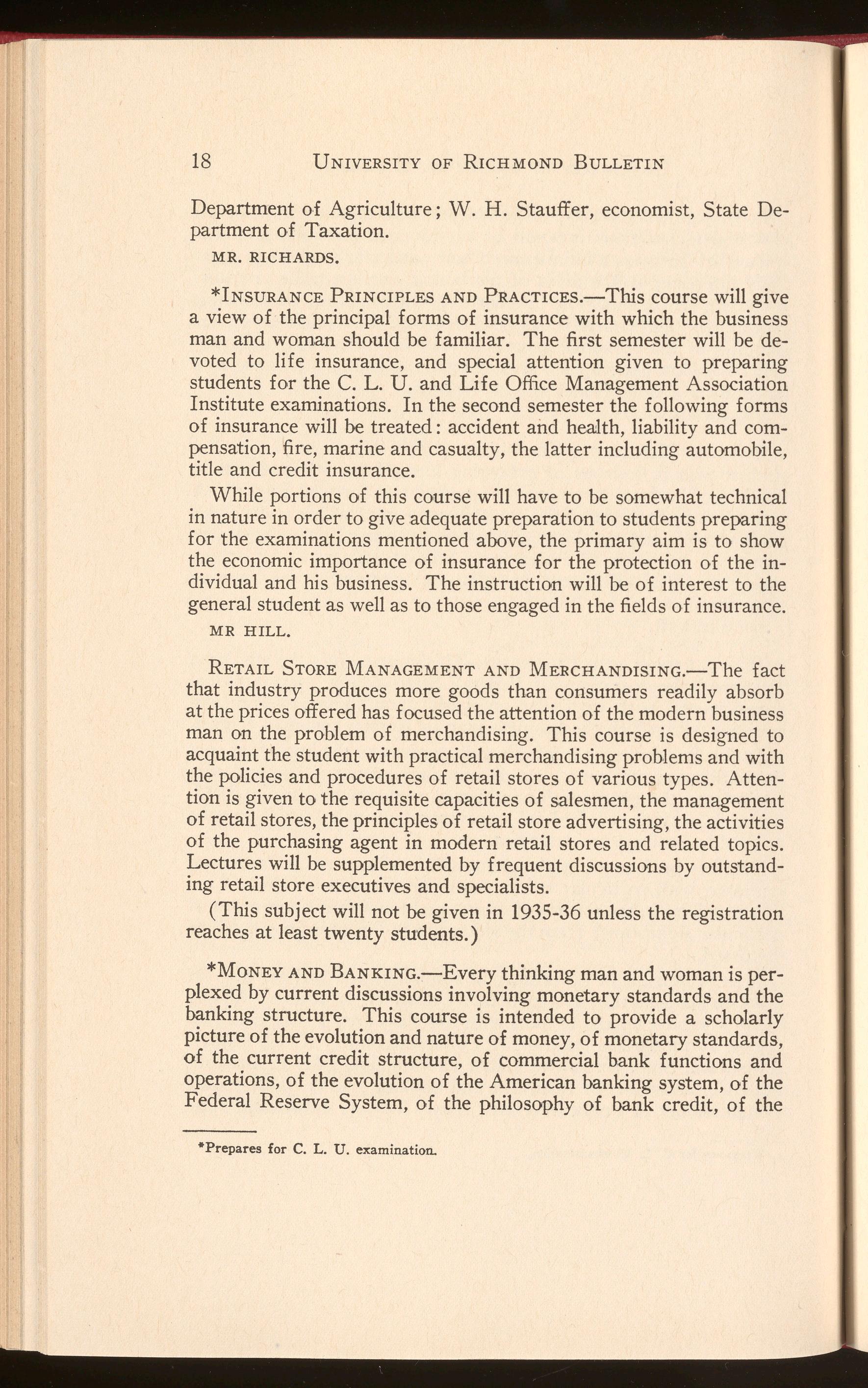
UNIVERSITYOF RICHMONDBULLETIN
Department o•f Agriculture; W. H. Stauffer, economist, State Department of Taxation.
MR.RICHARDS.
*INSURANCEPRINCIPLESANDPRACTICEs.-This course will give a view of the principal forms of insurance with which the business man and woman should be familiar. The first semester will be devoted to life insurance, and special attention given to preparing students for the C. L. U. and Life Office Management Association Institute examinations. In the second semester the following forms of insurance will be treated: accident and hea:lth, liability and compensation, fire, marine and casualty, the latter including automobile, title and credit insurance.
While portions of this course will have to be somewhat technical in nature in order to give adequate preparation to students preparing for the examinations mentioned above, the primary aim is to show the economic importance of insurance for the protection of the individual and his business. The instruction will be of interest to the general student as well as to those engaged in the fields of insurance.
MR HILL.
RETAIL STOREMANAGEMENTAND MERCHANDISING.-The fact that industry produces more goods than consumers readily absorb at the prices offered has focused the attention of the modern business man on the problem of merchandising. This course is designed to acquaint the student with practical merchandising problems and with the policies and procedures of retail stores of various types. Attention is given to the requisite capacities of salesmen, the management of retail stores, the principles of retail store advertising, the activities of the purchasing agent in modern retail stores and related topics. Lectures will be supplemented by frequent discussions by outstanding retail store executives and specialists.
(This subject will not be given in 1935-36 unless the registration reaches at least twenty students.)
*MONEYANDBANKING.-Every thinking man and woman is perplexed by current discussions involving monetary standards and the banking structure. This course is intended to provide a scholarly picture of the evolution and nature of money, of monetary standards, of the current credit structure, of commercial bank functions and operations, of the evolution of the American banking system, of the Federal Reserve System, of the philosophy of bank credit, of the
*Prepares for C. L. U examination.
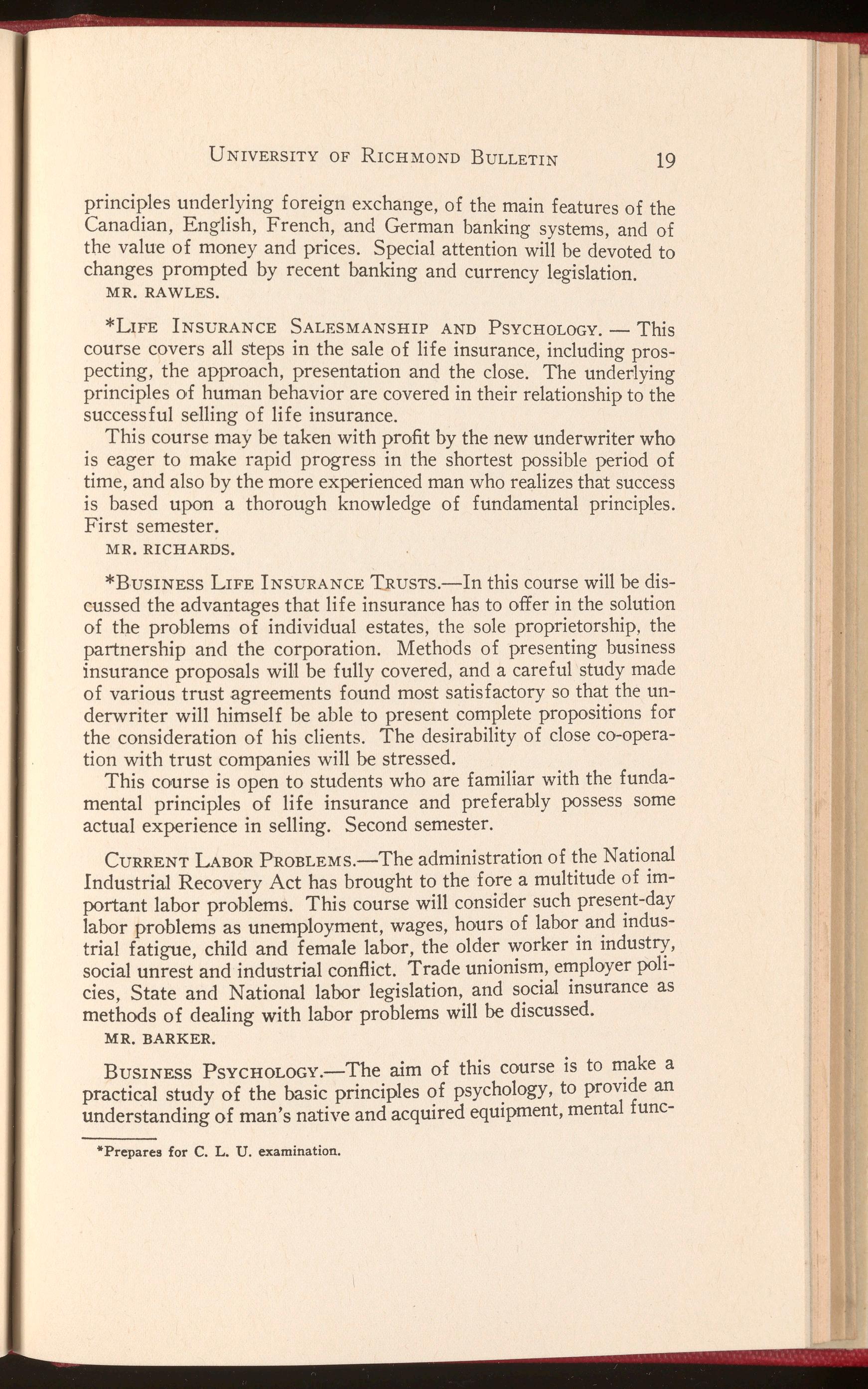
UNIVERSITYOF RICHMONDBULLETIN 19
principles underlying foreign exchange, of the main features of the Canadian, English, French, and German banking systems, and of the value of money and prices. Special attention will be devoted to changes prompted by recent banking and currency legislation.
MR. RAWLES.
*LIFE INSURANCE SALESMANSHIPAND PSYCHOLOGY.-This cou~se covers all steps in the sal~ of life insurance, including prospe~tt1:g, the approach, presentation and the close. The underlying pnnc1ples of human behavior are covered in their relationship to the successful selling of life insurance.
This course may be taken with profit by the new underwriter who is eager to make rapid progress in the shortest possible period of time, and also by the more experienced man who realizes that success is based upon a thorough knowledge of fundamental principles. First semester.
MR.RICHARDS.
*BusINESS LIFE INSURANCET;RusTs.-In this course will be discussed the advantages that life insurance has to offer in the solution of the problems of individual estates, the sole proprietorship , the partnership and the corporation. Methods of presenting business insurance proposals will be fully covered, and a careful study made of various trust agreements found most satisfactory so that the underwriter will himself be able to present complete propositions for the consideration of his clients. The desirability of close co-operation with trust companies will be stressed.
This course is open to students who are familiar with the fundamental principles of life insurance and preferably possess some actual experience in selling. Second semester.
CURRENTLABORPRoBLEMS.-The administration of the National Industrial Recovery Act has brought to the fore a multitude of important labor problems. This course will consider such present-day labor problems as unemployment, wages, hours of labor and industrial fatigue, child and female labor, the older worker in indust~, social unrest and industrial conflict. Trade unionism, employer policies, State and National labor legislation, and social insurance as methods of dealing with labor problems will be discussed.
MR. BARKER.
BUSINESS PsYCHOLOGY.-The aim of this course is to ~ake a practical study of the basic principles ~f psych?logy, to provide an understanding of man's native and acqmred eqmpment, mental func-
*Prepares for C. L. U. examination.
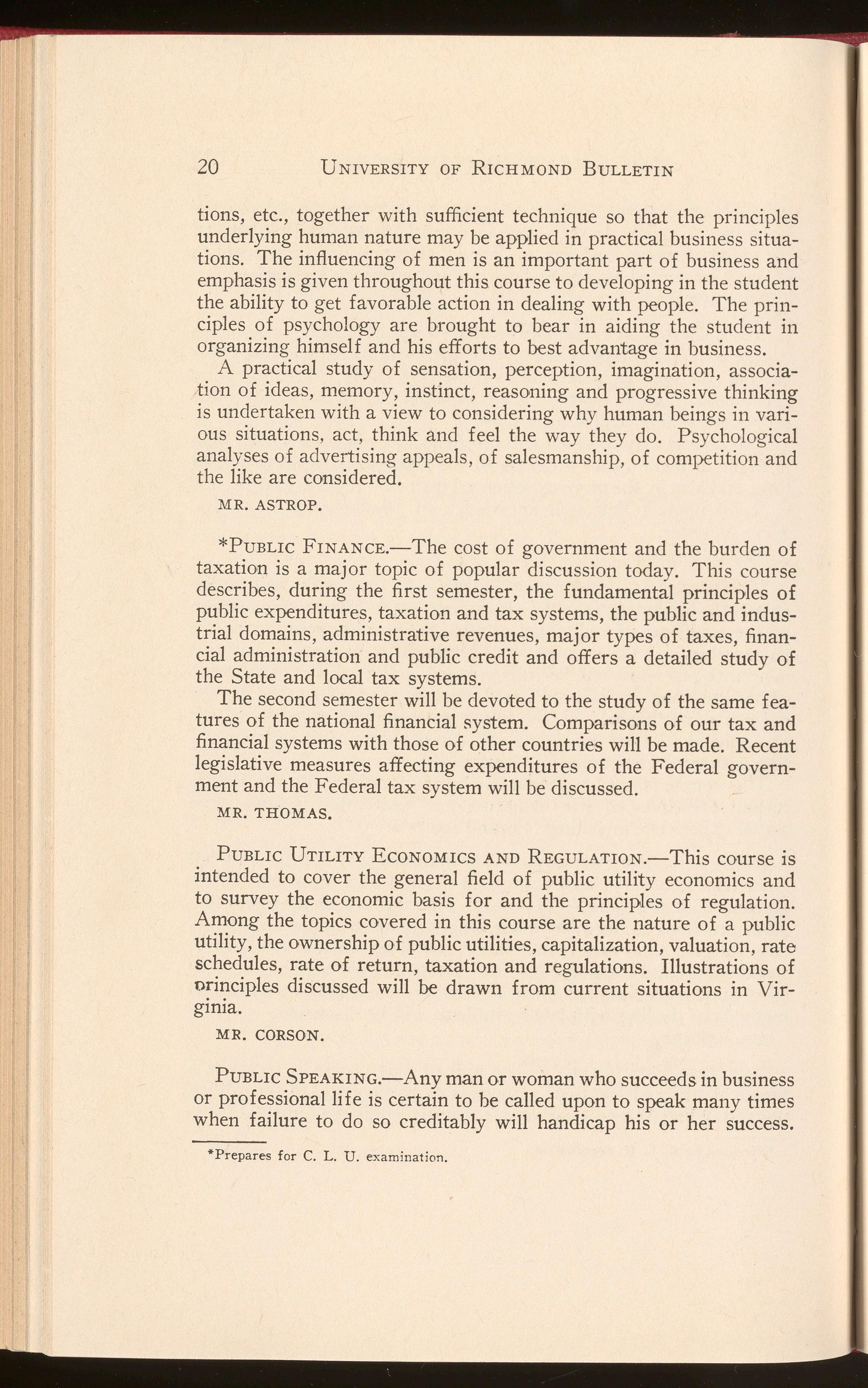
UNIVERSITYOF RICHMONDBULLETIN
tions, etc., together with sufficient technique so that the principles underlying human nature may be applied in practical business situations. The influencing of men is an important part of business and emphasis is given throughout this course to developing in the student the ability to get favorable action in dealing with people. The principles of psychology are brought to bear in aiding the student in organizing himself and his efforts to best advantage in business.
A practical study of sensation, perception, imagination, association of ideas, memory, instinct, reasoning and progressive thinking is undertaken with a view to considering why human beings in various situations, act, think and feel the way they do. Psychological analyses of advertising appeals, of salesmanship, of competition and the like are considered.
MR.ASTROP.
*PuBLIC FrnANCE.-The cost of government and the burden of taxation is a major topic of popular discussion today. This course describes, during the first semester, the fundamental principles of public expenditures, taxation and tax systems, the public and industrial domains, administrative revenues, major types of taxes, financial administration and public credit and offers a detailed study of the State and local tax systems.
The second semester will be devoted to the study of the same features of the national financial system. Comparisons of our tax and financial systems with those of other countries will be made. Recent legislative measures affecting expenditures of the Federal government and the Federal tax system will be discussed.
MR.THOMAS.
PUBLICUTILITY EcoNOMICSANDREGULATION.-This course is intended to cover the general field of public utility economics and to survey the economic basis for and the principles of regulation. Among the topics covered in this course are the nature of a public utility, the ownership of public utilities, capitalization, valuation, rate schedules, rate of return, taxation and regulations. Illustrations of orinciples discussed will be drawn from current situations in Virginia.
MR. CORSON.
PUBLICSPEAKING.-Any man or woman who succeeds in business or professional life is certain to be called upon to speak many times when failure to do so creditably will handicap his or her success.
*Prepares for C. L . U. examination.
RICHMONDBULLETIN
This course in the principles and practice of public speaking is designed to develop in the student the ability to speak effectively. Stress is laid upon a knowledge of the laws governing the logical presentation of material and emphasis is placed upon clear, scientific speech structure and cogent, persuasive delivery.
MR. RUFFIN.
*SocIOLOGYIN BusrnEss.-This course provides a comprehensive, practical study of the underlying principles of present-day society for students of business. It treats of the social order, social contacts, social interaction, social forces, social control, the social basis of the state, collective behavior and social progress. Attention is given to modern business morals and customs, to the improvement of industrial relations, and to the social ethics of accounting, advertising, finance, marketing, etc . The course will include text-book assignments supplemented by lectoces and the assignment of individual projects for investigation.
MR . HARLAN.

•Prepares for C. L. U. examination.

Schedule, 1935-1936






WNlfflT
